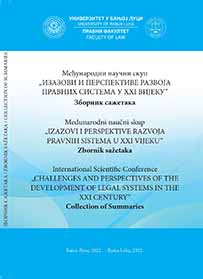КРИВИЧНО ДЕЛО УНОШЕЊА ОПАСНИХ МАТЕРИЈА У СРБИЈУ И НЕДОЗВОЉЕНО ПРЕРАЂИВАЊЕ, ОДЛАГАЊЕ И СКЛАДИШТЕЊЕ ОПАСНИХ МАТЕРИЈА ИЗ ЧЛАНА 266. КРИВИЧНОГ ЗАКОНИКА СРБИЈЕ
BRINGING DANGEROUS SUBSTANCES INTO SERBIA AND UNLAWFUL PROCESSING, DEPOSITING AND STOCKPILING OF DANGEROUS SUBSTANCES FROM ARTICLE 266 OF THE CRIMINAL CODE
Author(s): Ivana MarkovićSubject(s): Law, Constitution, Jurisprudence, Energy and Environmental Studies, Criminal Law, Civil Law
Published by: Правни факултет Универзитета у Бањој Луци
Keywords: criminal offense; waste; hazardous materials; environment; Serbia;
Summary/Abstract: The paper deals with the normative regulation and statistical representation of the offense Bringing dangerous substances into Serbia and unlawful processing, depositing and stockpiling of dangerous substances from Article 266 of the Criminal Code. Regarding the first-mentioned, the norm of Article 266 contains four forms of the offense and one additional provision in para. 4 (on the possibility to include the order to undertake protection measures if suspends sentence was pronounced). The forms of the crime relate to its basic form (para. 1), an aggravated form by abuse of position or power (para. 2), a qualified form if the offense results in destruction of animal and plant life to a high extent or pollution of the environment to such a degree that clean-up would require a long period of time or great expense (para. 3) and a special aggravated form if committing the offenses was organized (para. 5). One of the main characteristics of the crime is its administrative dependence, as well as the absolute prohibition of the import of dangerous substances into Serbia. Although the importance of the criminalized behaviour has been recognized in international documents and is present in Serbian society, the judicial statistics regarding convictions show, depending on the respective years, an absence and an under-representation of this crime. This stands in line with the general trend in Serbian criminal policy, where environmental crimes from Chapter XXIV of the Criminal Code are in the statistics represented mainly through one particular offense only, namely forest theft.
Journal: Зборник радова Међународни научни скуп „Изазови и перспективе развоја правних система у XXI вијеку"
- Issue Year: 2022
- Issue No: 2
- Page Range: 501-512
- Page Count: 12
- Language: Serbian

